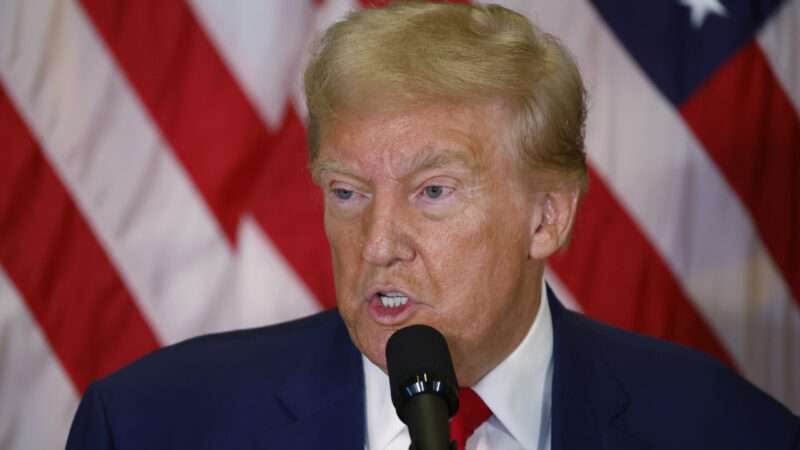
Former President Donald Trump last night reiterated his support for legalizing recreational marijuana in Florida—and added that he favors rescheduling cannabis under federal law and removing barriers to banking services for state-licensed marijuana businesses. Unlike Vice President Kamala Harris, his Democratic opponent, Trump has not endorsed repealing federal pot prohibition, a move that voters overwhelmingly favor. But his recent statements on marijuana reform, coming just before his first debate with Harris, suggest he recognizes the potential political potency of this issue.
"As I have previously stated, I believe it is time to end needless arrests and incarcerations of adults for small amounts of marijuana for personal use," Trump wrote on Truth Social, his social media site. "We must also implement smart regulations, while providing access for adults, to safe, tested product. As a Floridian, I will be voting YES on Amendment 3 this November."
Trump's endorsement, which he first signaled in an August 31 Truth Social post, could give a boost to Amendment 3, which would make it legal for adults 21 or older to possess three ounces or less of marijuana and allow recreational sales. As a constitutional amendment, the initiative needs support from 60 percent of voters to pass. Judging from polls conducted prior to Trump's endorsement, it was unclear whether the initiative would reach that threshold. If it does, Florida will be the 25th state to legalize recreational marijuana use.
In addition to backing Amendment 3, Trump said he supports the Biden administration's plan to move marijuana from Schedule I of the Controlled Substances Act, the most restrictive category, to Schedule III, which includes prescription drugs such as ketamine, Tylenol with codeine, and anabolic steroids. "As President," he wrote, "we will continue to focus on research to unlock the medical uses of marijuana [as] a Schedule 3 drug."
That reclassification, which is still pending, would facilitate medical research by removing regulatory barriers that are specific to Schedule I. It also would be a financial boon to the cannabis industry, allowing state-licensed suppliers to deduct standard business expenses when they pay their federal income taxes. But it would not legalize those businesses, which would remain criminal enterprises under federal law. Nor would it make marijuana legally available as a prescription drug, which would require regulatory approval of specific cannabis-based products.
There was previously some doubt about the fate of rescheduling under a second Trump administration. During his 2016 presidential campaign, Trump said states should be free to legalize marijuana. But he also made it clear that he took a dim view of that "bad" policy, which he said had caused "some big problems" in Colorado. And as Harris pointed out after Trump endorsed Amendment 3 last month, he took two steps as president that seemed to contradict his avowed preference for marijuana federalism.
Trump's first attorney general, Jeff Sessions, rescinded a Justice Department memo that encouraged federal prosecutors to leave state-licensed cannabis suppliers alone. Trump also proposed eliminating an annually renewed spending rider that bars the Justice Department from interfering with state medical marijuana programs. Although nothing came of either move, Harris argued that Trump had flip-flopped on marijuana reform—a criticism she is apt to repeat if the subject comes up during their debate on Tuesday night.
Last night, Trump also promised to "work with Congress to pass common sense laws, including safe banking for state authorized companies," with the aim of "supporting states rights to pass marijuana laws, like in Florida, that work so well for their citizens." Financial institutions are leery of serving the cannabis industry, which under current law could expose them to potentially devastating criminal, civil, and regulatory penalties. As a result, marijuana businesses have trouble raising capital and are forced to rely heavily on cash, which makes them a ripe target for robbery, sometimes with lethal results.
Despite that widely recognized problem, legislation aimed at protecting financial institutions that serve state-licensed cannabis suppliers has languished in Congress for years. If Trump is elected and keeps his promise to support such legislation, it could finally pass.
Although Trump's current position falls short of opposing the national ban on marijuana, his turnaround on the merits of state legalization and his late-breaking support for federal reform could help him in November. According to a Gallup poll conducted last October, 70 percent of American adults—including 87 percent of Democrats, 70 percent of independents, and 55 percent of Republicans—think marijuana should be legal.
A Pew Research Center survey conducted in January put support for recreational legalization at 57 percent. An additional 32 percent of respondents—for a total of 89 percent—thought marijuana should be legally available as a medicine. Among Democrats and independents who leaned toward the Democrats, 72 percent supported recreational legalization, compared to 42 percent of Republicans and GOP leaners. Support was especially strong among younger respondents, with 71 percent of 18-to 29-year-olds and 62 percent of 30-to 49-year-olds favoring full legalization
Theoretically, Trump's belated support for marijuana reform could alienate Republicans who oppose legalization so much that they refrain from voting at all. But as with his triangulation on abortion, Trump seems to have calculated that the risk is small compared to the chance of attracting the independents who could be crucial to his victory. The public comments on the pending reclassification of marijuana, 69 percent of which endorsed the change or said it did not go far enough, provide some indication of which side is more motivated by this issue.
Trump's marijuana moves might encourage Harris to distinguish herself from him by emphasizing her support for repealing the federal ban. As a California senator in 2018, Harris cosponsored a bill that would have descheduled marijuana, and she introduced a similar bill in 2019. But President Joe Biden has always resisted that step, and the 2024 Democratic platform says nothing about federal legalization.
The platform instead emphasizes that marijuana use should not be treated as a crime. "No one should be in jail just for using or possessing marijuana," it says. "Sending people to prison for possession has upended too many lives and incarcerated people for conduct that many states no longer prohibit."
That stance not only exaggerates the risk of "jail" (let alone "prison") for people convicted of simple possession; it is indistinguishable from the position that Trump is now taking. Unless Harris wants to give up her chance of capitalizing on this issue, she may have to reiterate her past support for eliminating the conflict between state and federal marijuana laws, as opposed to merely ameliorating the consequences of that contradiction.
The post Trump Endorses Federal Marijuana Reforms and Reiterates His Support for Legalizing Pot in Florida appeared first on Reason.com.







